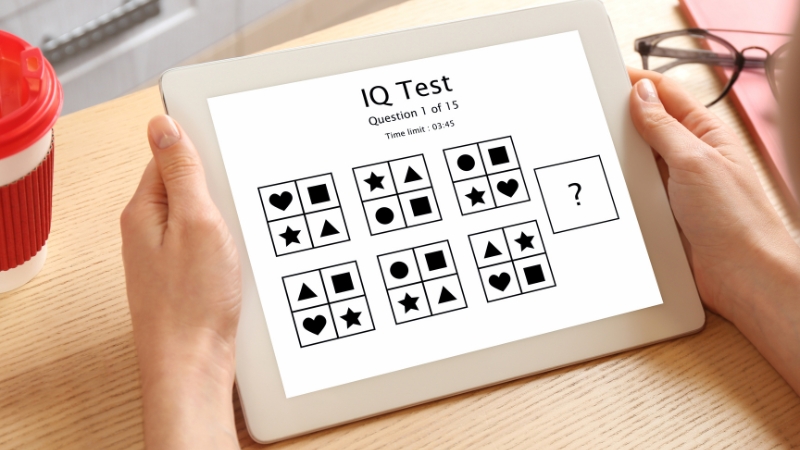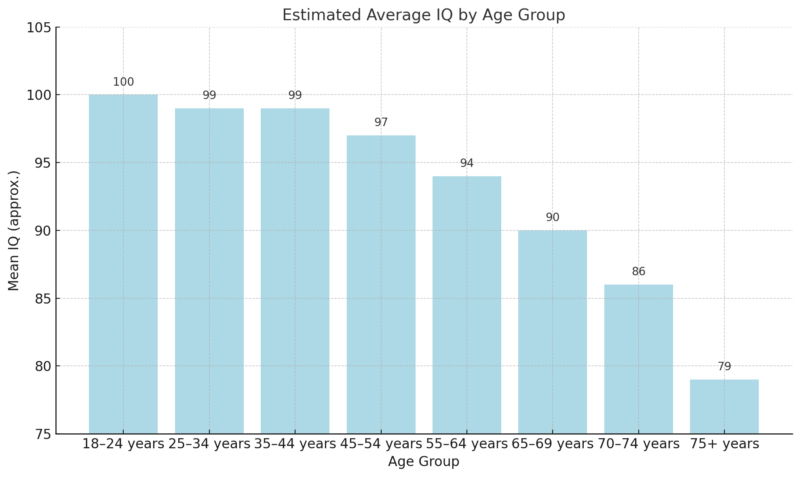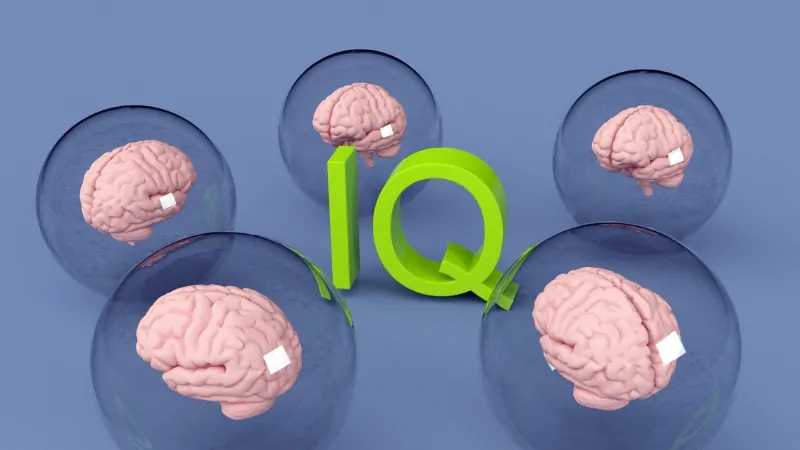IQ stands for intelligence quotient. Originally, it was literally a quotient: the ratio of “mental age” to chronological age multiplied by 100.
For example, a 10-year-old scoring at the level of an average 12-year-old had an IQ ratio of 120. Modern IQ tests no longer use that old formula; instead, they use a deviation IQ – a standardized score based on a test-taker’s performance relative to a representative sample of peers.
Test publishers calibrate scores so that the median is 100 and the distribution follows a bell curve, according to edubloxtutor.com. On most popular tests (like the Wechsler and Stanford–Binet scales), about 50% of people score between 90 and 109 (considered “average”), and about 95% score between 70 and 130.
Scores above or below that range are much less common, as shown in Table 1.
Table of Contents
ToggleIQ Classification Ranges and Approximate Prevalence
IQ Range
Classification
Approx. % of Population
130 and above
Very Superior (Gifted)
~2%
120–129
Superior
~7%
110–119
High Average
~16%
90–109
Average
~50%
80–89
Low Average
~16%
70–79
Borderline Low
~7%
Below 70
Extremely Low
~2%
IQ classifications commonly used in modern IQ tests (e.g. Wechsler scales) with the percentage of people falling into each range.
By definition, IQ is scaled so that about 2/3 of the population scores in the broadly “average” band (85–115, encompassing the High Average, Average, and Low Average sub-ranges), while very high and very low scores are relatively rare.
These labels are descriptive and do not rigidly determine a person’s capabilities – they are just convenient categories psychologists use when discussing test results.
Test Your IQ with These 15 Questions
Curious about where you stand on the IQ scale? Take this quick, research-backed quiz to discover your estimated IQ score right away.
How Are IQ Tests Administered?

Typically, a licensed psychologist gives a battery of subtests measuring various reasoning and problem-solving skills, such as vocabulary knowledge, math and logic problems, pattern recognition puzzles, memory exercises, and spatial manipulation tasks, as noted by verywellmind.com.
Examples of well-known IQ tests include the Wechsler Adult Intelligence Scale (WAIS) for adults and the Wechsler Intelligence Scale for Children (WISC) for school-age individuals, as well as the Stanford–Binet Intelligence Scales. Each test has its own scoring, but most are standardized to the same scale (mean 100, SD 15) so that scores are roughly comparable.
It’s important to note that **an IQ score is not an absolute measure like inches or pounds – it’s an ordinal ranking on a bell curve. If you score 130, it means you performed better on the test than about 98% of people your age.
In contrast, a score of 70 would exceed only about 2% of your peers. IQ tests aim to measure general cognitive ability (often referred to as g), which correlates with academic learning capacity.
However, they do not directly measure creativity, practical problem-solving, emotional intelligence, or social skills. A person can have strengths in those areas that aren’t captured by a traditional IQ test.
What Does an IQ of 120 Mean?
Now let’s focus on an IQ score of 120, since it’s often a point of interest. An IQ of 120 is significantly above average, about 20 points higher than the mean of 100. Statistically, 120 is roughly the 91st percentile for the general population. In other words, someone with an IQ of 120 scored higher than about 91% of people.
This falls in the “Superior” range in many classification schemes (as shown in Table 1). While not in the top 2% “gifted genius” category, an IQ of 120 indicates a high level of general intelligence.
How rare is it? Approximately 1 in 10 people would score 120 or above.
An IQ of 120 suggests strong reasoning and verbal abilities that would make many intellectual tasks (analyzing data, learning new technical skills, reading and writing at a high level) easier than they would be for the average person. This level of IQ has been associated with many professional occupations.
In one survey, psychologists Glen Wilson and Diana Grylls even sketched out “typical” jobs by IQ level: they suggested that an IQ of ~120 might be common among school teachers, pharmacists, accountants, nurses, stenographers, and managers, for example.
(By comparison, they put physicians, lawyers, and engineers around IQ 130, and professors/research scientists around 140\.) Of course, these are broad generalizations – plenty of teachers or nurses have higher IQs, and someone with an IQ 120 can be found in any field. But it gives a rough sense that IQ 120 is high enough to pursue advanced education and intellectually demanding careers.
It’s important to stress that IQ alone doesn’t guarantee success – personality, creativity, motivation, and opportunity matter greatly. However, cognitive ability (as indexed by IQ tests) does correlate with certain outcomes.
For example, numerous studies have documented a moderate to strong link between IQ-type scores and job performance in many occupations. Generally, more complex jobs (those requiring lots of problem-solving, technical expertise, or training) show a higher correlation between cognitive test scores and performance.
Industrial-organizational psychologists Frank Schmidt and John Hunter famously found that of all measured traits, general mental ability was the single best predictor of job performance across a wide range of careers. They note that brighter individuals tend to learn job-relevant knowledge faster and perform more effectively in training and on the job.
An IQ of 120 thus positions someone well above the average workforce cognitive level, which could translate into an easier time understanding complex work tasks or qualifying for roles that require quick learning and analytical thinking.
At the same time, IQ 120 is not “genius” – many people with this score would not stand out as prodigies, and other qualities like creativity or interpersonal skills can equalize or surpass raw IQ in real-world scenarios. In fact, psychologists often caution that beyond a certain point, extra IQ points yield diminishing returns in day-to-day advantages.
For example, someone with an IQ 120 will likely find college coursework manageable, but someone with an IQ 140 might not automatically get better grades or be more successful in life – factors like work ethic and social skills begin to play a huge role.
IQ Across Ages and Generations

One common question is whether IQ changes with age. Because IQ is defined relative to age peers, the intention is that an individual’s IQ score should remain fairly stable over their lifetime (barring extraordinary circumstances).
A child who tests at IQ 130 in elementary school will likely score around 130 again if re-tested as a teen or adult, since they are always being compared to others their age.
In practice, scores can fluctuate a bit – for instance, about 40% of children will have their IQ move up or down by 5+ points if retested later. But large swings are unusual unless something in the environment or the person’s development changes significantly.
IQ tests are age-normalized, meaning the average is set to 100 within each age group. So, an average 10-year-old and an average 40-year-old both get IQ 100 by definition.
However, this doesn’t mean our cognitive abilities are static throughout life. In fact, psychologists differentiate between fluid intelligence (the ability to solve novel problems, quickly reason, and adapt to new information) and crystallized intelligence (accumulated knowledge and skills).
Fluid abilities tend to peak in young adulthood and then gradually decline in later years, while crystallized knowledge (like vocabulary and factual knowledge) can increase or remain stable well into middle age or beyond.
Because IQ tests usually measure a mix of these, the raw scores on certain subtests do change with age. Test publishers account for this by giving separate norms for different age brackets. If you compare older adults to younger adults using the same yardstick, you do see some drop-off in average IQ scores in advanced age due to cognitive aging.
For example, data from the Wechsler Adult IQ scales (WAIS-IV) indicate that if 20–24 year-olds have an average IQ of 100, then by age 45–54 the average is about 97 (slightly lower), and by age 65–69 it’s around 90, dropping further to the mid-80s by the 70s.
Estimated Average IQ by Age Group (Cross-Sectional)

Average IQ by age group when using the same scoring standards across ages. In practice, IQ tests are normed per age group, so each age would average 100 by definition. But if we hold the standard constant (e.g. compare everyone to the young adult norm), older adults score lower on average due to age-related cognitive slowing.
For instance, 65–69 year-olds score about a decade behind 20–24 year-olds on the same test, corresponding to an average IQ ~90 relative to young adults according to consensus.app.
By the late 70s, the average might be in the upper 70s or low 80s on that scale. This reflects normal cognitive aging, especially in fluid reasoning tasks, not a literal drop in “intelligence” for any given individual. Many older people compensate with experience and knowledge (crystallized intelligence), which isn’t fully captured by timed IQ test puzzles.
Average IQ by Continent
Studies comparing global IQ levels, while imperfect, consistently show regional patterns:
Continent / Region
Avg IQ (∼)
Highlights
East Asia (China, Japan, Korea, Singapore)
105–107
Globally highest; South Korea ~102–10645; Japan 106.48; Taiwan/Singapore 105–106
Europe
99–101
Countries like Finland, Germany, UK, Netherlands fall in this range
North America
~~97–99**
USA ~97.4; Canada ~99.5
Oceania (Australia/NZ)
99–102
Australia ~99.2; NZ ~98.6
Latin America & Caribbean
≈85–90
Most countries in 80s; some below 80
Middle East & South Asia
~80–85
Countries like India (~76–82), Iran ~106 sits as exception
Sub‑Saharan Africa
70–75
Lowest regional averages; testing variability exists
Key Takeaways
- East Asia consistently leads the world in average IQ (≈105–107).
- Europe, North America, and Oceania cluster near the global average (~99–101).
- Latin America, Middle East, South Asia fall lower, typically in the high 70s to mid-80s.
- Sub‑Saharan Africa averages are the lowest (~70–75), reflecting wide disparities in education and development.
These differences closely track environmental influences—education quality, nutrition, healthcare, and cultural factors—rather than innate ability, according to datapandas.org
The data on average IQ by continent highlights clear regional disparities likely influenced by complex socioeconomic, educational, and environmental factors.
East Asia leads globally, with countries like Japan, China, and Singapore consistently achieving IQ scores in the 105–107 range—often attributed to strong education systems, cultural emphasis on academic achievement, and stable development.
Europe, North America, and Oceania follow closely, maintaining average IQs around 99–101, suggesting widespread access to education and relatively high living standards.
The United States slightly lags behind Canada and parts of Europe, with an average IQ of approximately 97.4, potentially reflecting socioeconomic inequality and educational system variation. Latin America and the Caribbean exhibit lower averages (≈85–90), likely influenced by uneven development and limited educational resources.
The Middle East and South Asia fall further, with IQs often in the low 80s, although exceptions like Iran show how national investment in education can elevate averages. Sub-Saharan Africa shows the lowest regional scores (70–75), but these results are often questioned due to variability in testing standards, linguistic barriers, and lack of access to formal education.
It’s crucial to interpret these figures within context—IQ is shaped by environment, not just innate intelligence.
The disparities reflect broader global inequalities rather than inherent cognitive differences between populations. Overall, the data underscores the impact of social infrastructure on cognitive development and performance.
The Flynn Effect: Rising and Falling IQ Trends Across Generations
While individual IQ tends to remain stable across adulthood, average IQ scores across generations have significantly changed – a phenomenon known as the Flynn effect, named after researcher James R. Flynn.
Throughout the 20th century, IQ scores rose by roughly 3 points per decade, especially in areas like abstract reasoning and non-verbal problem-solving. For example, a person scoring 100 on a modern test might have scored 115–120 on a 1970s version, due to rising norms (Flynn, 1984; Flynn, 2007).
These gains are widely attributed to better education, improved nutrition, smaller family sizes, and more cognitively stimulating environments. However, this trend appears to have plateaued or reversed in many developed nations in the 21st century. A large-scale study in Norway (Bratsberg & Rogeberg, 2018) found IQ declines among people born after the mid-1970s.
Similarly, a 2023 study in the U.S. (Dworak et al., 2023, Northwestern University) analyzing data from nearly 400,000 adults showed modest IQ declines between 2006–2018 in verbal, math, and logical reasoning domains, with only spatial reasoning improving.
Researchers suggest this decline may reflect changes in education focus, increased screen time, shifts in lifestyle and health, and reduced practice with traditional abstract tasks. It doesn’t mean people are “less intelligent,” but rather that test-taking environments and cognitive habits have changed.
Overall, the Flynn effect underscores that IQ is heavily shaped by environment, and these gains—or losses—are not fixed.
The Highest IQs Ever Recorded – Genius and Beyond

IQ scores above ~130 are often labeled “very superior” or “gifted,” but what about IQs of 160, 180, 200, or higher? Such extreme scores are exceedingly rare – by definition, an IQ of 160 is about one-in-30,000 (0.0033%) in frequency if we assume a normal distribution.
Measuring at these extremes is also problematic: most standard IQ tests don’t have enough difficult questions to reliably distinguish someone who is 1-in-10,000 smart from 1-in-100,000 smart.
In other words, the tests have a ceiling. Nonetheless, there have been individuals throughout history and today who are reputed to have extraordinarily high IQs.
Some have taken specialized high-ceiling tests or had their childhood test results extrapolated to estimate IQs far beyond the usual range.
It’s important to note the limitations here: scores above about 160 are less precise and often come from non-mainstream tests or “ratio IQ” calculations (the old mental age method) rather than deviation IQ. Still, it’s fun to look at who’s in the “IQ Olympian” league.
Notable high-IQ individuals:
Perhaps the most famous is Marilyn vos Savant, an American magazine columnist who was listed in the Guinness Book of World Records for “Highest IQ” in the 1980s with a score of 228 according to mentalup.com. This was a ratio IQ derived from a childhood Stanford-Binet test she took at age 10, where she performed at the level of an average 22-year-old.
In deviation IQ terms, 228 is off the charts (over +4 standard deviations). Guinness eventually retired the “highest IQ” category, partly because beyond a certain point scores aren’t directly comparable.
Another prodigy, Kim Ung-Yong of South Korea, was a child prodigy who by age 5 could solve calculus problems on TV and reportedly scored above 210 on an early IQ test. He was once lauded as having the highest recorded IQ as well, and his score of 210 appears in many sources.
Highest IQ’s in History: No 2. Terence Tao – IQ 225-230.Tao specializes in the study of harmonic analysis and others pic.twitter.com/67ArHXExfn
— YBLNigeria (@yblnigeria) June 26, 2016
In the modern day, Dr. Terence Tao, a mathematics professor at UCLA, is often cited as the smartest living person. Terence Tao’s IQ has been informally estimated at 225–230 based on his childhood test scores and exceptional achievements.
Tao taught himself arithmetic by age 2, scored a 760 on the SAT-Math at age 8, and earned a PhD in math at 20; he’s since won the Fields Medal (the highest honor in mathematics).
While he never sat for a public “IQ test” as an adult, his childhood scores on tests like the Stanford-Binet put him three standard deviations above the ceiling, hence the 230 estimate. Another individual known for extreme cognitive ability is William James Sidis, an early 20th-century American who was a legend of prodigious intellect – he entered Harvard at age 11.
Sidis’s IQ was never tested by modern methods, but it’s often rumored to have been in the 250–300 range (likely an exaggeration or an artifact of older scoring methods)
More verifiable are people who have scored very high on adult high-ceiling tests. Christopher Langan, sometimes dubbed “the smartest man in America” in the media, reportedly scored around 190–200 on IQ tests (including a perfect score on an older Mega Test).
Langan is an autodidact known for developing a “Theory of the Universe” and gained fame from interviews about his high IQ. Rick Rosner, a television writer, also achieved scores in the 190+ range on multiple ultra-hard tests. And Evangelos Katsioulis, a Greek psychiatrist, has scores around 198, making him one of the highest among members of international high IQ societies.
Chess grandmaster Garry Kasparov is often cited with an IQ around 190 as well (though this may be an extrapolation from his chess brilliance).
To put these in perspective, Table 5 lists a few renowned high-IQ individuals and their approximate scores:
Examples of Extremely High IQ Scores
Individual
Reported IQ
Notability & Notes
William James Sidis (1898–1944)
250–300 (est.)
Legendary prodigy; entered Harvard at age 11. Claimed values are speculative (no standard test).
Marilyn vos Savant (b. 1946)
228
Highest recorded (Guinness 1980s). Adult author & columnist. Score was a ratio IQ from childhood.
Terence Tao (b. 1975)
~230
“Mozart of Math.” Fields Medalist mathematician. Child prodigy from Australia; IQ extrapolated from early tests.
Kim Ung-Yong (b. 1962)
210
Korean child prodigy; spoke 5 languages by age 5. Invited to NASA at age 7. Now a professor.
Christopher Langan (b. 1952)
~200
Self-taught intellectual known for very high test scores (~99.9999th percentile).
Rick Rosner (b. 1960)
~192
TV producer and high-IQ test aficionado. Took many supervised IQ tests, averaging in 190s.
Garry Kasparov (b. 1963)
~190
World Chess Champion (1985–2000). IQ tested in high 180s according to some sources.
Evangelos Katsioulis (b. 1976)
~198
Greek psychiatrist. Founded the World Intelligence Network; scored near 200 on high-ceiling tests.
It’s also worth noting that beyond a certain point, a high IQ score may have diminishing relevance. Once you’re far to the right of the bell curve, other factors start to dominate achievement – creativity, drive, opportunity, and even luck.
History has examples of ultra-high-IQ individuals who led relatively ordinary lives, and others with merely above-average IQ who achieved extraordinary things.
Albert Einstein, for instance, is often estimated to have had an IQ around 160 (he was never formally tested) – lower than some people listed in Table 5, yet his creative contributions to physics were unparalleled. So while it’s entertaining to talk about who has the “highest IQ ever,” these numbers should be taken with a grain of salt.
As one IQ commentator quipped, having an IQ of 180 versus 150 is like being 7’5” tall versus 6’10” tall – either way, you’re tall enough that other factors (like skill and perseverance) determine if you become an NBA star or not.
IQ Tests vs. Aptitude Tests: What’s the Difference?

In the United States, you may hear about aptitude tests like the SAT, ACT, GRE, LSAT, ASVAB, etc., which are used for college admissions, job screening, or career placement. How do these differ from a classic IQ test?
Both IQ tests and aptitude tests are standardized assessments of abilities, and there is overlap, but there are key differences in purpose and content aptitude-test.com.
IQ tests (general intelligence tests) are designed to measure broad cognitive ability – essentially the test-taker’s overall capacity for reasoning, problem-solving, learning, and understanding complex ideas.
They typically include a variety of subtests (verbal comprehension, working memory, processing speed, spatial reasoning, quantitative reasoning, etc.) to capture the g factor, or general intelligence.
The goal is to assess intellectual potential rather than knowledge in any specific domain. For example, an IQ test might ask you to solve novel puzzles or analogies that do not require prior subject-matter study. IQ tests yield a score (like the IQ number) that ranks you against a representative population.
Aptitude tests, on the other hand, are more specific. An aptitude test evaluates your capacity or knack for a particular type of task or field of knowledge. For instance, the SAT was originally called the “Scholastic Aptitude Test” – it aims to predict a high school student’s ability to succeed in college by testing math, critical reading, and writing skills.
Likewise, the ASVAB (Armed Services Vocational Aptitude Battery) is used by the U.S. military to gauge specific aptitudes (general science, electronics, mechanical comprehension, verbal, etc.) to place recruits into suitable job training programs.
Aptitude tests often resemble achievement tests because they assume some learned knowledge, but they focus on assessing how well you can apply that knowledge or pick up new skills relevant to a certain domain.
For example, a mechanical aptitude test might present diagrams of gears or pulleys to see if you intuit mechanical relationships. A programming aptitude test might examine logical thinking and pattern detection useful for coding.
In summary, IQ tests aim to measure general intellectual potential, whereas aptitude tests measure the potential to excel in a specific area or task. They also differ in scoring. IQ tests produce the familiar IQ score with a mean of 100 and a standard deviation of 15, allowing comparison across ages and populations.
Aptitude tests typically do not use an “IQ” scale; instead, they might give a percentile or a category (e.g. “you scored in the top 10% for mechanical reasoning”) relevant to the group who takes that test.
Aptitude test scores are often interpreted in context – for example, a certain score might suggest you’d perform well in a programming course, or qualify you for a particular job training program.
IQ and Mental Health – What’s the Connection?
While IQ and mental health are separate domains, research has found interesting overlaps. High IQ is sometimes correlated with better coping strategies, especially in academic and structured environments. However, it can also come with increased risk of overthinking, perfectionism, anxiety, or social isolation, particularly in highly intelligent children and adolescents who feel “different” from their peers.
Conversely, individuals with very low IQ scores may be at increased risk for certain developmental or psychiatric disorders, including intellectual disability, autism spectrum conditions, and mood regulation challenges.
Psychologists stress that IQ is not a protective shield—mental health must be supported at all levels of cognitive ability. Emotional intelligence, self-esteem, and social connection play just as important a role in well-being as raw cognitive capacity.
Use in the U.S.

Traditional IQ tests are most often used in educational and clinical settings, for identifying children for gifted programs (often requiring IQ ≥ 130 or so) or diagnosing learning disabilities or intellectual disabilities (IQ below ~70 can be one criterion, alongside adaptive functioning).
They are administered one-on-one by psychologists. It’s rare for employers or colleges to give applicants a full “IQ test” due to expense and legal sensitivities. Instead, they use aptitude or ability tests tailored to their needs.
For example, SAT/ACT for college admissions measure verbal and mathematical reasoning (and are highly correlated with IQ, but also reflect schooling); GRE, MCAT, LSAT for grad or professional schools measure aptitude in specific domains (analytical writing, scientific reasoning, logical reasoning, etc.).
Many employers use tests like the Wonderlic Personnel Test (a 12-minute general cognitive test often used in hiring, famously administered to NFL players) – which is basically an IQ-type test under another name. They also use situational judgment tests or job knowledge tests, which measure fit and skills.
Meanwhile, civil service and military entrance exams are essentially aptitude batteries. For instance, the U.S. military’s ASVAB yields an “AFQT” score that determines enlistment eligibility – this AFQT score is strongly correlated with IQ (the military even equates an AFQT percentile to an approximate IQ for their classification purposes), but it’s presented as a measure of trainability for service roles.
On a broader scale, data on average IQ by state in the U.S. continues to show regional patterns that loosely align with education quality and income levels and it sits arround 98 points.
Bottom Line
To conclude, IQ is a fascinating and useful metric when understood properly. An IQ of 120, in particular, signifies a well-above-average intellect that can open many doors academically and professionally.
It is somewhat rare (top ~10%) and tends to make learning and problem-solving easier, but it’s not so high as to be freakish or to guarantee eminence. People with IQ 120 and people with IQ 100 often work side by side and both can excel given the right training and effort.
Internationally, IQ comparisons show how the environment shapes cognitive performance, highlighting the importance of investing in education, nutrition, and health to unlock human potential.
And at the extremes, while we celebrate genius, we also recognize that beyond a point, labels like “IQ 180” are just numbers on paper unless they translate into creativity and contribution.
In the end, think of IQ as one important piece of the puzzle. It’s like a measure of how powerful a computer’s processor is – but what really matters is what you program that computer to do.
High IQ can be a boon, but it’s mindset, creativity, character, and opportunity that turn potential into real-world success. As the data shows, intelligence is not a single score but a multifaceted trait, and human worth and ability go far beyond what any test can capture.
Related Posts:
- The World’s Largest City You’ve Never Heard Of - Why…
- Nebraska Population Statistics for 2025 - An In-Depth Look
- Minneapolis Population Growth in 2025 - A Closer Look
- 2016 Births in the US - A Detailed Look at the…
- Closer Look at Population of Pennsylvania in 2025
- Closer Look at New Jersey’s Population Data in 2025








